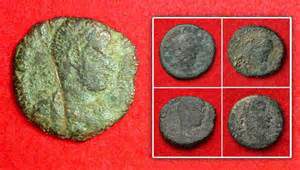 Recent discovery of Roman coins in Japan has baffled archaeologists as reported by several news outlets. The four Roman copper coins were retrieved from soil beneath Katsuren Castle on Okinawa Island. Even though the designs on the coins are difficult to decipher as they have been eroded over time, the x-ray analysis done later revealed several of the relics bore the image of Emperor Constantine I. It has also been reported that since excavation on the site began in 2013, researchers have also found six more coins which may date back to the Ottoman Empire in the late 17th century. The Roman coins appear to be much older, dating back to at least 400AD according to estimates.
Recent discovery of Roman coins in Japan has baffled archaeologists as reported by several news outlets. The four Roman copper coins were retrieved from soil beneath Katsuren Castle on Okinawa Island. Even though the designs on the coins are difficult to decipher as they have been eroded over time, the x-ray analysis done later revealed several of the relics bore the image of Emperor Constantine I. It has also been reported that since excavation on the site began in 2013, researchers have also found six more coins which may date back to the Ottoman Empire in the late 17th century. The Roman coins appear to be much older, dating back to at least 400AD according to estimates.
The board of education in the Japanese city of Uruma announced the discovery, and said the story of how the coins came to arrive in Japan still remain a mystery. Katsuren Castle was known to have been the focal point of trading partnerships with China and other Asian countries, but ties to Europe were not evident until the recovery of the coins. The archeologists and experts are asking if there were more extensive trading relationships with Europe in that region or if the coins were brought there by merchants. The experts do not believe that there was any direct link between the Roman Empire and Katsuren Castle, but the discovery confirms how that region had trade relations with the rest of Asia.
The ruins of the castle were registered in 2000 on the UNESCO World Heritage list as part of the Gusuku Sites and Related Properties of the Kingdom of Ryukyu.
The coins will be analyzed further and displayed at Uruma City museum on Okinawa until the end of November 2016.















